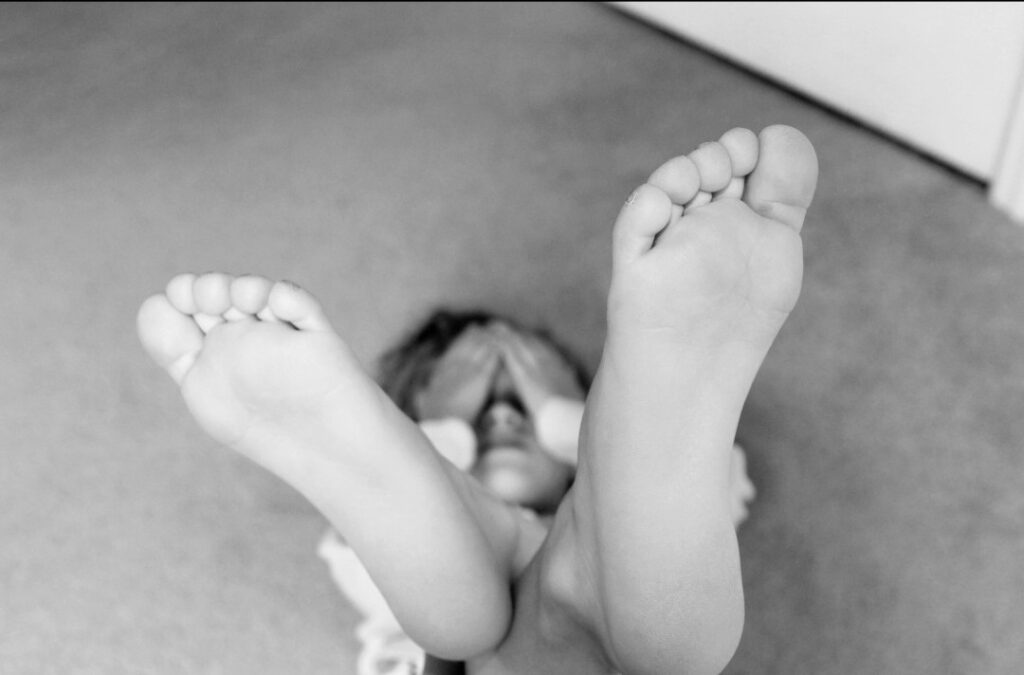In our travels we have found a number of parents who describe having an autistic child who likes being barefoot.
With that being the case we thought it could be helpful to consider the consequences and causes for this preference.
Autism and taking shoes and socks off
Speaking personally I as a neuro-typical mum enjoy the feeling of being barefoot.
This is particularly the case for some reason when I’m walking outside on grass or pavement.
Whilst I do enjoy the feeling I wouldn’t suggest it is something that I do more than on sporadic occasions.
But for some people with autism it can be all day every day they want to walk around with their shoes and socks off.

Here are some reasons which may be behind the behaviour;
Sensory sensitivities
Many autistic people experience sensory sensitivities, which means they have a heightened awareness of sensory input.
This can include sensitivity to touch, textures, sounds, smells, and tastes.
The sensation of shoes can be very uncomfortable or overwhelming for some autistic children.
This is especially if the shoes are tight, itchy, or have seams that rub against their feet.
Going barefoot can help them to avoid these unpleasant sensations and feel more comfortable.
Tactile input
Conversely it may not be that the autistic individual dislikes the feeling of shoes and socks.
It may be that they like the feeling of the floor.
Some autistic children find the tactile stimulation of walking barefoot to be calming and soothing.
The sensation of different textures against their skin can provide them with feedback, which helps them to be more aware of their body and its position in space.
This can be especially helpful for children with autism who have difficulty with coordination or balance.
Grounding
Linked to the tactile input, a feeling of being grounded may be the key motivator.
Some autistic children find that going barefoot helps them to feel more connected to their surroundings.
This can be helpful for children who experience anxiety or sensory overload, as it can help them to feel more calm and centered.
General freedom
Some autistic children simply enjoy the freedom and collective experience of going barefoot.
They may like the feeling of the different textures of the ground under their feet, the warmth of the sun on their skin, or the cool breeze on their toes.
Going barefoot can also help them to feel more connected to nature, which can be a calming and soothing.
Routine
The process of removing their socks and shoes may have developed in itself into a routine.
As most parents in our position know, routines can develop almost immediately and be hard to stop.
So it may not have anything to do with sensory preferences. An autistic child may take their shoes and socks off because that’s just what they do.
What to do about an autistic child who always wants to be barefoot
Knowing the motivation for removing their shoes and socks will only be half the battle.
Stopping them from taking them off will likely be a goal for many parents reading this article.
It’s not that any of us want to make our children uncomfortable, it’s for reasons like safety and overall conformity that you may want to intervene.
Here are some tactics to consider;
Use gradual introduction
If your child is resistant to wearing shoes, start by introducing them gradually.
Allow them to walk barefoot in safe, controlled environments, such as your home or backyard.
Gradually increase the time they spend wearing shoes in different settings.
Experiment with different options
Choose shoes and socks that are comfortable and provide good sensory feedback.
Think practically about what you decide to put on your child.
Avoid shoes that are too tight, itchy, or have rough seams.
Consider barefoot-inspired shoes or sandals that provide a more natural feel.
Involve them in decision making
When it comes to choosing shoes and socks, provide your child with a degree of control. This could be at the point of purchase or when choosing in the mornings.
Autonomy is often important to autistic children so them having a degree of influence may help.
Reward good behaviour
If your child leaves their shoes or socks on then be sure to let them know how happy you are.
Give them that warm reassurance of smiles, hugs and even a treat if you deem appropriate.
Communicate why shoes are needed
Communication blockers can make explaining reasons behind wearing footwear difficult. If that is the case for you then consider different ways of getting the point across.
Experiment with pictures and drawings demonstrating when and where people wear footwear.
You could even demonstrate using toys like action figures highlighting how they may ‘hurt’ their feet going barefoot.
Summary – Autistic Child Likes Being Barefoot?
It is important to note that not all autistic children will prefer to go barefoot.
Some children may find it uncomfortable or unsafe to go barefoot, and others may not have any particular preference.
It is always important to respect a child’s individual preferences and to work with them to find ways to make them comfortable and safe.
If your autistic child likes to be barefoot then experiment with different options and tactics listed above.
With time and subtle intervention you will likely make progress in this challenging area.
Any tips or ideas?
We would love to hear from you if you have got any techniques or ideas for our readers to try.
Be sure to leave a comment if any of the above has helped or if you have any ideas we can add to this article.
Also be sure to search for any other articles you might find helpful.
Try for example searching below for topics like ‘meltdown’ or ‘communication’.

